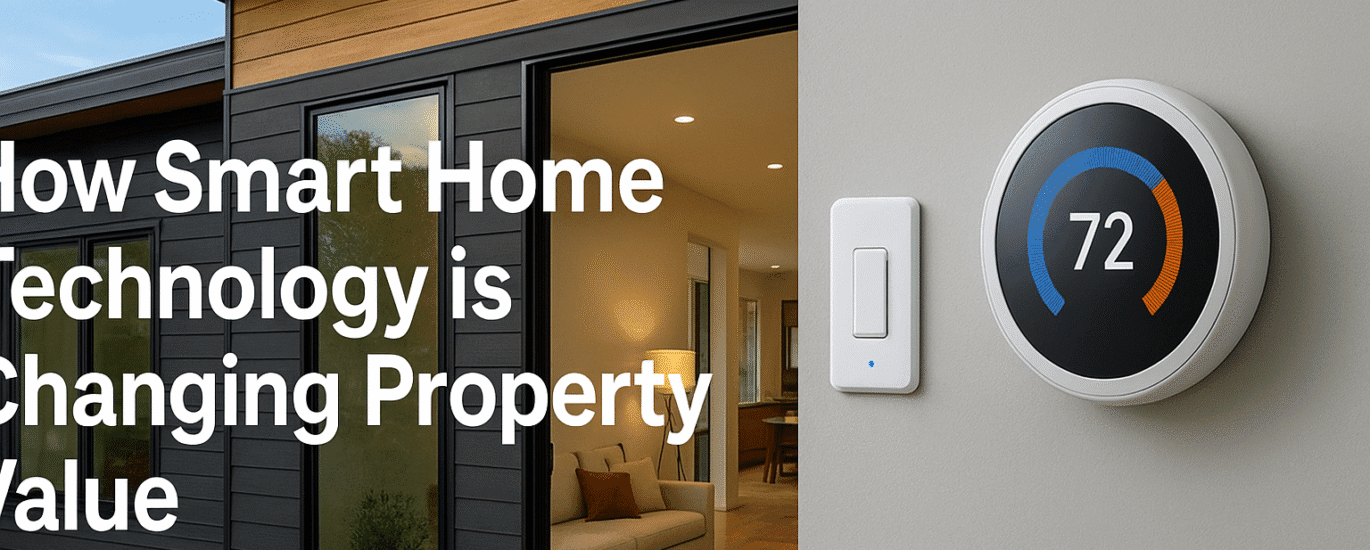Table of Contents
Technology has become an inseparable part of modern living, influencing nearly every industry, and real estate is no exception. With the rise of smart home systems, buyers are no longer just evaluating a property based on its location, square footage, or design. Instead, they are placing significant value on integrated technology that enhances comfort, efficiency, and security. This shift is transforming how homes are priced, marketed, and sold, making technology a critical factor in determining property value.
The Rise of Smart Home Features
Over the past decade, smart home technology has evolved from a luxury into a mainstream expectation. Features such as automated lighting, smart thermostats, voice-controlled assistants, and advanced security systems are now standard in many modern residences. These solutions offer convenience, but they also provide measurable benefits such as energy savings and increased safety, both of which directly contribute to a home’s market appeal.
Real estate data suggests that homes equipped with smart features often command higher selling prices compared to similar properties without them. For buyers, these upgrades signal a forward-thinking investment, while sellers benefit from higher returns on their property.
Energy Efficiency and Sustainability
One of the most compelling aspects of smart home technology is its role in sustainability. Buyers today are increasingly eco-conscious, seeking homes that reduce energy consumption and minimize environmental impact. Smart thermostats, intelligent lighting systems, and water-saving devices significantly cut utility bills while supporting a greener lifestyle.
A home that demonstrates efficiency through technology is more likely to stand out in a competitive market. Not only does this save money for homeowners, but it also enhances long-term value as energy-efficient living continues to grow in demand worldwide.
Security as a Value Driver
Safety has always been a top priority for homeowners, and technology has revolutionized how it’s delivered. Advanced surveillance systems, smart locks, and real-time monitoring applications provide peace of mind for residents while adding tangible value to properties.
Buyers are increasingly willing to pay more for homes that offer built-in, reliable security solutions. In fact, security-focused technology often makes a property more appealing to families, high-net-worth individuals, and those living in urban areas where security is a premium concern.
Appeal to the Modern Buyer
Technology is particularly influential in attracting younger buyers, such as millennials and Gen Z, who are now entering the housing market in greater numbers. This demographic grew up with digital connectivity and values convenience and innovation in daily life.
For them, smart homes represent not only comfort but also a lifestyle aligned with modern expectations. Sellers who invest in these technologies often find their properties moving faster in the market, reducing time spent on listings and negotiations.
Integration with Real Estate Marketing
The influence of technology is not limited to property features—it also extends to how homes are marketed and sold. Real estate agents increasingly highlight smart features in property descriptions and virtual tours, knowing that these elements capture buyer attention.
A home equipped with visible, easy-to-use smart systems creates a memorable impression and differentiates itself from competing listings. This marketing edge adds yet another layer of value, benefiting both sellers and agents alike.
Future Trends in Smart Home Value
As technology continues to evolve, its impact on property value will only grow stronger. Future developments may include AI-driven predictive maintenance, fully automated energy management, and interconnected community smart grids. Homes that adopt these advancements early will be positioned as premium assets in the real estate landscape.
For property investors, staying updated on these trends is essential. Ignoring technology risks making a property feel outdated, while embracing it ensures long-term value retention and growth.
Conclusion
Technology is reshaping real estate in profound ways, making smart home features a significant factor in determining property value. From energy efficiency and security to buyer appeal and marketing advantages, the influence of technology on modern homes is undeniable.
For homeowners, adopting smart features means greater comfort and long-term returns. For buyers, it represents an investment in a future-ready lifestyle. As the real estate market continues to evolve, one thing is clear: technology is no longer optional—it is essential in shaping property value today and tomorrow.
✅ Ready to Make the Smart Move?
Explore our latest smart home listings or book a free consultation with a Heptagon advisor today. Let’s help you find a home that’s not just modern—but future-ready.
Call us: +971 50 203 5824
Email: info@heptagonproperties.com
Website: https://heptagonproperties.com
Check out our contracting company: https://charminardubai.com/
Follow us on Instagram | LinkedIn | YouTube | Facebook | Tiktok
Frequently Asked Questions (FAQs) Questions (FAQs)
How does smart home technology affect property value?
Smart home technology increases property value by offering enhanced security, energy efficiency, and modern convenience, which appeal to today’s buyers. Homes with these features often sell faster and at higher prices.
What are the most valuable smart home upgrades?
The most valuable upgrades include smart thermostats, security systems, lighting controls, and energy-efficient appliances. These features not only improve daily living but also reduce long-term utility costs.
Do all buyers care about smart technology?
While younger buyers tend to prioritize technology more, even traditional buyers now see the value in energy savings, safety, and convenience offered by smart features.
Is it expensive to install smart home systems?
Costs vary depending on the features you choose. Basic devices like smart plugs or thermostats are affordable, while advanced security or whole-home automation systems require a larger investment.
Can smart home technology reduce utility bills?
Yes. Smart thermostats, lighting, and water-saving devices can significantly lower energy and water bills, making the home more cost-effective and sustainable.
Will smart homes remain valuable in the future?
Absolutely. As technology continues to advance, properties with built-in smart features are likely to retain or even increase their value because they align with future living trends.
Can I add smart home technology to an older property?
Yes, smart home technology can be integrated into older properties without requiring a complete renovation. Many devices—such as smart plugs, Wi-Fi-enabled thermostats, and wireless security cameras—are designed for easy installation and don’t require major structural changes. For larger upgrades, like whole-home automation or energy management systems, professional installation may be needed, but even then, the process is far less invasive than a traditional remodel. Adding technology to an older property not only modernizes it but also makes it more appealing to buyers who want convenience and efficiency without sacrificing character.





